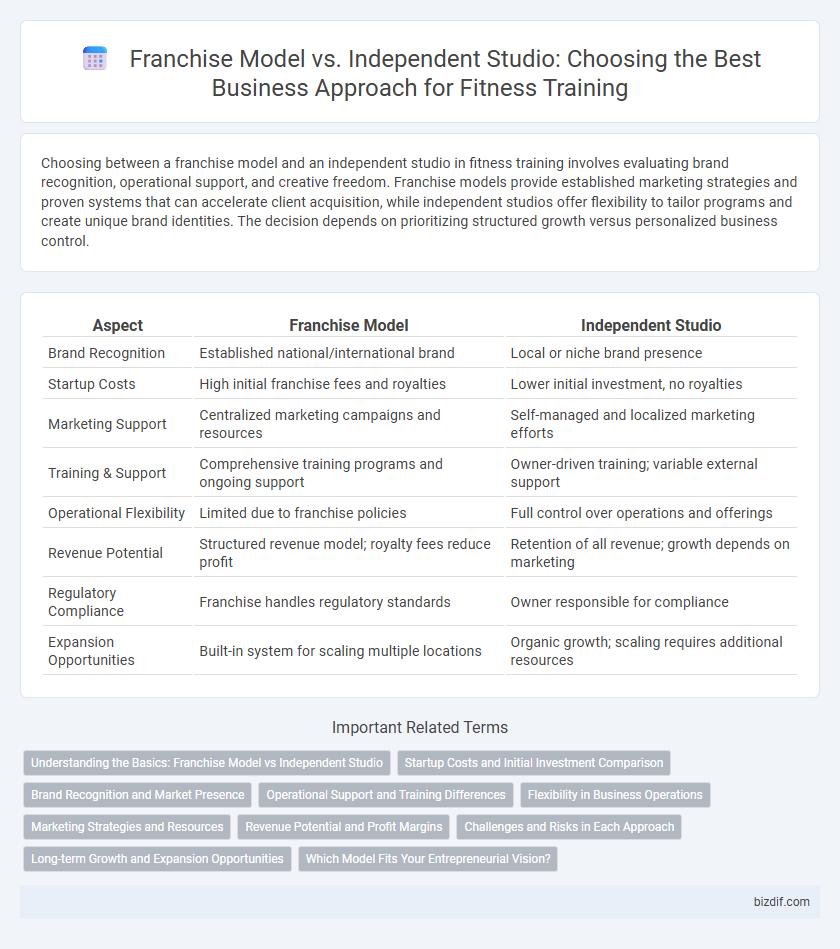Choosing between a franchise model and an independent studio in fitness training involves evaluating brand recognition, operational support, and creative freedom. Franchise models provide established marketing strategies and proven systems that can accelerate client acquisition, while independent studios offer flexibility to tailor programs and create unique brand identities. The decision depends on prioritizing structured growth versus personalized business control.
Table of Comparison
| Aspect | Franchise Model | Independent Studio |
|---|---|---|
| Brand Recognition | Established national/international brand | Local or niche brand presence |
| Startup Costs | High initial franchise fees and royalties | Lower initial investment, no royalties |
| Marketing Support | Centralized marketing campaigns and resources | Self-managed and localized marketing efforts |
| Training & Support | Comprehensive training programs and ongoing support | Owner-driven training; variable external support |
| Operational Flexibility | Limited due to franchise policies | Full control over operations and offerings |
| Revenue Potential | Structured revenue model; royalty fees reduce profit | Retention of all revenue; growth depends on marketing |
| Regulatory Compliance | Franchise handles regulatory standards | Owner responsible for compliance |
| Expansion Opportunities | Built-in system for scaling multiple locations | Organic growth; scaling requires additional resources |
Understanding the Basics: Franchise Model vs Independent Studio
A franchise model in fitness training offers a proven business blueprint, brand recognition, and corporate support, which can accelerate growth and reduce startup risks. Independent studios provide flexibility in programming, branding, and operational decisions, allowing trainers to tailor services and cultivate a unique client experience. Choosing between a franchise and an independent studio depends on priorities such as control, investment level, and scalability in the competitive fitness market.
Startup Costs and Initial Investment Comparison
Franchise fitness studios often require a higher initial investment, typically ranging from $100,000 to $250,000, due to franchise fees, branding, and established marketing systems. Independent fitness studios tend to have lower startup costs, commonly between $10,000 and $50,000, allowing more flexibility but requiring more effort in brand development and customer acquisition. Evaluating these financial commitments is crucial for entrepreneurs balancing upfront costs with long-term operational control.
Brand Recognition and Market Presence
Franchise models in fitness training benefit from established brand recognition and broader market presence, attracting clients through proven marketing strategies and consistent service quality. Independent studios often face challenges building brand awareness but can differentiate themselves with personalized offerings and local market adaptability. The strength of franchised fitness brands typically accelerates customer trust and expansion opportunities compared to solo ventures.
Operational Support and Training Differences
Franchise models in fitness training provide structured operational support through standardized training programs, marketing assistance, and ongoing business coaching, ensuring consistency and brand recognition. Independent studios offer greater flexibility in operational decisions but lack the comprehensive support system, requiring owners to manage marketing, staff training, and operational challenges independently. The scalability and risk mitigation in franchise models contrast with the creative autonomy found in independent studios.
Flexibility in Business Operations
Franchise models offer standardized protocols and established brand recognition, which can limit flexibility in adapting fitness programs and marketing strategies to local markets. Independent studios enjoy greater autonomy in customizing class schedules, pricing, and service offerings to meet specific community needs and trends. This operational flexibility can enhance customer satisfaction and foster innovation in fitness training approaches.
Marketing Strategies and Resources
Franchise models leverage established brand recognition and centralized marketing resources to drive customer acquisition and retain consistent messaging across locations, offering franchisees access to proven advertising campaigns and digital platforms. Independent studios rely heavily on localized marketing strategies, utilizing social media, community events, and personalized client engagement to build a niche market presence. Franchisees benefit from shared marketing budgets and national promotions, while independent operators often invest more in tailored, creative content to differentiate themselves in competitive fitness markets.
Revenue Potential and Profit Margins
Franchise models in fitness training benefit from established brand recognition and marketing support, often resulting in higher initial revenue potential compared to independent studios. Independent studios typically enjoy greater control over pricing and operational costs, leading to potentially higher profit margins despite lower overall revenue. The choice between franchise and independent models fundamentally impacts financial performance, with franchises leveraging scale and branding while independents capitalize on customization and cost efficiency.
Challenges and Risks in Each Approach
Franchise models in fitness training often face challenges such as high initial fees, strict operational guidelines, and limited flexibility, which can restrict innovation and local market adaptation. Independent studios risk financial instability due to lack of brand recognition and marketing support, while also bearing full responsibility for compliance, staff training, and customer acquisition. Both models encounter risks related to market competition, changing consumer preferences, and the need for continuous investment in updated equipment and technology.
Long-term Growth and Expansion Opportunities
Franchise models offer scalable growth through established branding, standardized operations, and centralized marketing, enabling rapid expansion with lower individual risk. Independent studios provide greater control and flexibility but often face slower growth due to limited resources and marketing reach. Long-term expansion favors franchises for systematic scaling, while independent studios might excel in niche market adaptability and personalized community engagement.
Which Model Fits Your Entrepreneurial Vision?
Choosing between a franchise model and an independent fitness studio hinges on your entrepreneurial vision, risk tolerance, and desire for brand autonomy. Franchise models offer established branding, proven operational systems, and marketing support, ideal for entrepreneurs seeking minimized startup risks and rapid customer acquisition. Independent studios provide complete creative control, flexibility in service offerings, and potential for unique brand identity, appealing to entrepreneurs prioritizing innovation and personalized customer experiences.
Franchise Model vs Independent Studio Infographic

 bizdif.com
bizdif.com